Photo
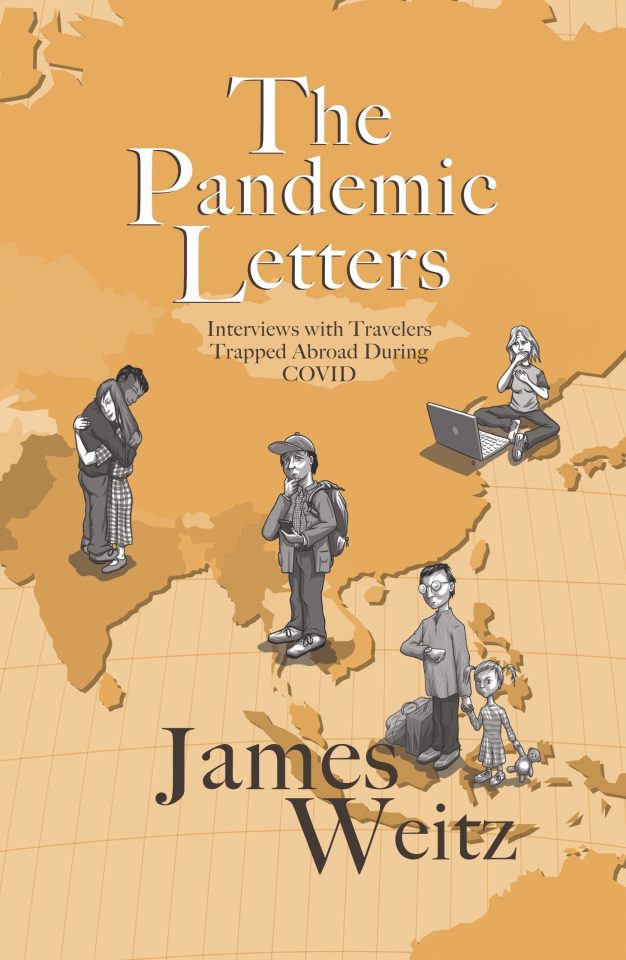
Explore O:JA&L’s Buttonhook Press offerings on Amazon. Support O:JA&L’s free presses. Subscribe to the O:JA&L YouTube channel. Become an O:JA&L Member through Patreon. Follow O:JA&L on Facebook. Buttonhook Press Authors available on Amazon James Weitz The Pandemic Letters: Interviews with travelers trapped abroad during COVID How we managed during the slow-motion train-wreck that was the worldwide COVID-19 lockdown. Title: The Pandemic Letters: Interviews with Travelers Trapped Abroad During Covid Author: James Weitz Publisher: OPEN: Journal of Arts & Letters (O:JA&L)/Buttonhook Press (November 30, 2022) Language: English Paperback: 175 pages ISBN-10: 1737774291 ISBN-13: 978-1-7377742-9-7 Item Weight: 11.4 ounces Dimensions: 6 x 0.4 x 9 inches The Pandemic Letters: Interviews with Travelers Trapped Abroad During Covid Available now from Amazon. James Weitz chronicles the experiences of international travelers unexpectedly forced to cope with the consequences of the 2020 COVID 19 Pandemic. As COVID-19 swept across the globe in early 2020, flights were cancelled, governments imposed lockdowns and sealed their borders, and the free movement of people worldwide was halted. The lives of twenty-six such people were abruptly altered when they became stuck in unexpected circumstances and unfamiliar locations — usually foreign countries. In this book, they speak of the extraordinary challenges they faced: finding new work, the stress of being separated from family, dealing with long-distance relationships, trying to marry loved ones, divorces, unexpected deaths, negotiating multiple national government bureaucracies simultaneously, and learning to cope with new cultures and ways of thinking. In the words of unlucky and bewildered people faced with daunting circumstances: (Kuala Lumpur) We’ve tried getting married in four different countries: Malaysia, Thailand, China, Russia. (Ho Chi Minh City) I’m scared of not having enough to eat. I have to buy food from nuns and charities. (Taipei) So far, they’re just ranting thoughts, but I’m afraid I’m going to slip more. (Taipei) My 9-year-old is stuck in Palau. All the flights are cancelled. (Belo Horizonte, Brazil) My marriage did not survive the Pandemic. That’s OK, though. For me things always happen with a purpose. (Phnom Penh, Cambodia) One thing led to another, and now she’s pregnant. So, my life is about to get a whole lot more interesting and purposeful. I’m 54, never had children. I didn’t want to be an old father, but it looks like that’s what’s going to happen. About the writer: James Weitz is a travel writer, satirist, and documentary filmmaker. His writing has appeared in Mekong Review and various online journals. Available now from Amazon. OJAL Art Incorporated, publishing since 2017 as OPEN: Journal of Arts & Letters (O:JA&L) and its imprints Buttonhook Press, HOT BUTTON PRESS Contemporary Issues, and HIGH BUTTON PRESS Contemporary Art, supports writers and artists worldwide. Follow O:JA&L on Facebook. OPEN: Journal of Arts & Letters (O:JA&L) recommends the services of Duotrope. Duotrope® https://ojalart.com/buttonhook-pressauthors-available-on-amazonjames-weitzthe-pandemic-lettersinterviews-with-travelers-trapped-abroadduring-covid/?utm_source=ReviveOldPost&utm_medium=social&utm_campaign=ReviveOldPost
0 notes
Photo
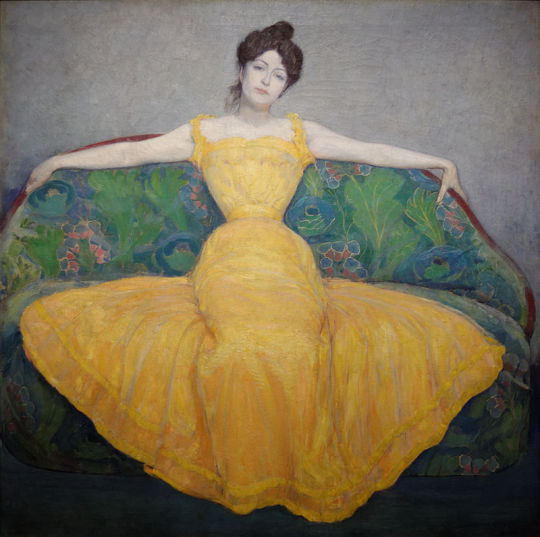
Charlie Brice Advice from the Couch Today, they say, is the first day of the rest of your life unless you’re co-dependent, then it’s the first day of the rest of someone else’s life. Co-dependent: a shibboleth of the Therapeutic Industrial Complex (TIC) itself a complex of psychobabble— the reductive shorthand of the terminally unimaginative. What is an analyst, asks St. Aubyn, but a former patient who couldn’t think of something better to do? Dr. G was so scared of cats she had to stand up when one came into a room— so frozen, standing there, that our kitties couldn’t tell the difference between her leg and that of an armchair. Another analyst, Dr. M, insisted that everyone from serial adulterers to those with ADD, to people with social anxiety who couldn’t pee, pined for the opposite gender’s genitals. Want to guess what fantasy drove poor Dr. M? You don’t need a Ph.D. to know that he wanted to be a she. Whether you’re bi-polar I or II, a malignant narcissist or spiritual arsonist, an anal, oral, or phallic personality, have major depression or anxiety in a minor key, it comes down to this: You have your problems, I have mine. Our tenure on this planet is perilous and doubtful—ours alone to fix. About the writer: Charlie Brice is the author of Flashcuts Out of Chaos (2016), Mnemosyne’s Hand (2018), and An Accident of Blood (forthcoming), all from WordTech Editions. His poetry has been nominated for the Best of Net anthology and twice for a Pushcart Prize and has appeared in over eighty publications. Image: Woman in Yellow by Max Kurzweil (1867-1916). Oil on canvas. No size specified. 1907. Public domain. https://ojalart.com/brice-poem/?utm_source=ReviveOldPost&utm_medium=social&utm_campaign=ReviveOldPost
0 notes
Photo
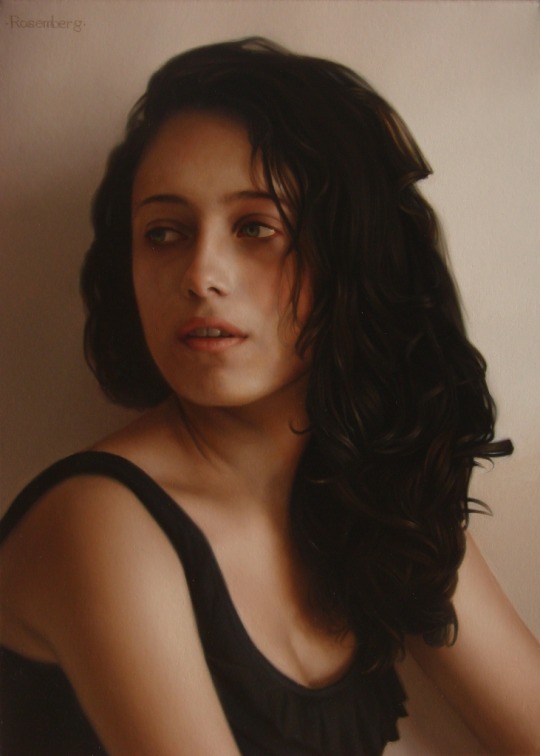
Rachel Custer The Way to God Runs Through a Panic Attack The doctor warns me against drugs, orders Ativan by injection. Peace is a heat in the veins. A chemical seeking the right man to minister to. I pulse through the world like the wrong need. Can any peace be bad? The nurse nods off on a cot somewhere in a room behind her eyes where I am not crying. The last thing we are is alone. Banging spoons, wobbling saws, off-key blues, moving anything to make noise. Somebody might hear, you know. Somebody might hear. Might turn their attention our way. Might save us. About the writer: Rachel Custer is the Poetry Editor and a reviewer and editorialist at O:JA&L. Her first full-length poetry collection, The Temple She Became, is available from Five Oaks Press. Other work has previously been published or is forthcoming in Rattle, OSU: The Journal, The American Journal of Poetry, B O D Y, [PANK], and The Antigonish Review. On February 13, 2019, Rachel Custer became a recipient of a 2019 Fellowship from the National Endowment for the Arts. Rachel Custer is the poetry editor at O:JA&L. Image: Camille (3) by Alejandro Rosemberg. Oil on canvas. 19.7 x 14.2 inches. 2013. By permission. About the artist: Alejandro Rosemberg is an Argentine fine artist trained by Claudio Bogino in the classical style of the Italian Great Masters. He studied color under Graydon Parrish at the Grand Central Academy of New York. His works are presently being exhibited in the United States and Canada, respectively represented by Principle Gallery in Virginia and White Rock Gallery in Vancouver. Passionate about teaching the techniques he uses, he invests much time and dedication to his drawing and painting classes and workshops held in Brazil, the USA, and Argentina. Rosemberg is the O:JA&L Featured Artist for February 2019. https://ojalart.com/featured-writer-rachel-custerpoetrythe-way-to-god-runs-through-a-panic-attack/?utm_source=ReviveOldPost&utm_medium=social&utm_campaign=ReviveOldPost
0 notes
Photo

Buttonhook Press: 2020 Pamphlet Series Editorials on Issues of Poetic Practice (Click on the title to explore or download this free PDF.) Rachel Custer Safe Spaces: A Pretty Lie About the writer: Rachel Custer is a past Poetry Editor, reviewer, and editorialist at O:JA&L. Her first full-length poetry collection, THE TEMPLE SHE BECAME, is available from Five Oaks Press. Other work has previously been published or is forthcoming in Rattle, OSU: The Journal, The American Journal of Poetry, B O D Y, [Pank], and The Antigonish Review. On February 13, 2019, Rachel Custer became a recipient of a 2019 Fellowship from the National Endowment for the Arts. Cover Image: Orpheus by Odilon Redon (1840-1916). Pastels on paper. 68.8 x 56.8 cm. Between 1903-1910. Public domain. https://ojalart.com/buttonhook-press2020-pamphlet-serieseditorials-on-issues-of-poetic-practicerachel-custer/?utm_source=ReviveOldPost&utm_medium=social&utm_campaign=ReviveOldPost
0 notes
Photo
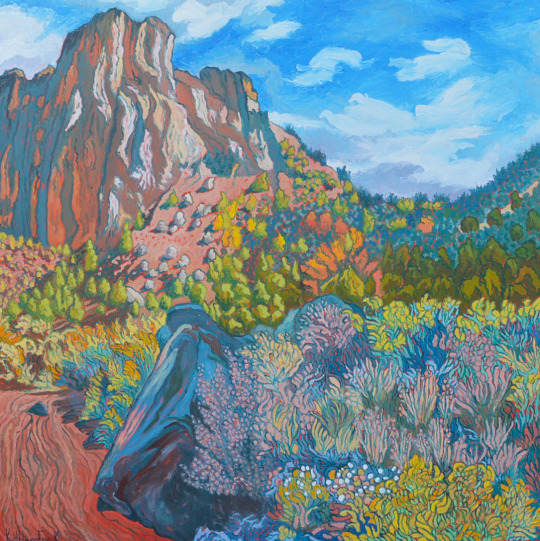
Explore O:JA&L’s Buttonhook Press offerings on Amazon. Subscribe to the O:JA&L YouTube channel. Become an O:JA&L Member through Patreon. Follow O:JA&L on Facebook. Support Pamelyn Casto's text for writers: Flash Fiction: Alive in the Flicker Support O:JA&L’s free presses. HIGH BUTTON PRESS Contemporary Art The 2024 O:JA&L Featured Artist Masters Series Portfolio Spotlights Kathleen Frank ESSENCE & ATMOSPHERE Click on the title to explore or download the free PDF chapbook. Copyright © 2024 by HIGH BUTTON PRESS Contemporary Art An imprint of OPEN: Journal of Arts & Letters (O:JA&L) All rights reserved on behalf of OJAL Art Incorporated, O:JA&L/BHP/HBPCI/HBPCA, and Kathleen Frank. Publishing since 2017 as OPEN: Journal of Arts & Letters (O:JA&L) and its imprints Buttonhook Press, HOT BUTTON PRESS Contemporary Issues, and HIGH BUTTON PRESS Contemporary Art, OAI supports writers and artists worldwide. Set in Garamond and GARAMOND ALLCAPS and formatted in CreateSpace. ABOUT THE ARTIST: Santa Fe artist KATHLEEN FRANK travels throughout the Southwest/West, seeking landscape paintings vistas. Using vibrant hues, she captures light, pattern, and a glint of logic in complex terrains. Exhibitions by Ms. Frank include among their number Northwest Montana History Museum, UNM Valencia; International Art Museum of America, MonDak Heritage Center Art & History Museum, St. George Museum of Art, WaterWorks Museum, Sahara West Gallery, La Posada de Santa Fe, Roux & Cyr Fine Art Gallery, and Jane Hamilton Fine Art. Important press attention for Ms. Frank's works include LandEscape Art Review, MVIBE, Art Reveal, Magazine 43, and Southwest Art. Art in Embassies, a U.S. State Department program, selected her work for display in Kuala Lumpur, Malaysia. Image: Diablo Canyon Wash by Kathleen Frank. Oil on canvas. 37.5 x 37.5 inches. 2022. By permission. All images by Kathleen Frank are used by permission. OJAL Art Incorporated, publishing since 2017 as OPEN: Journal of Arts & Letters (O:JA&L) and its imprints Buttonhook Press, HOT BUTTON PRESS Contemporary Issues, and HIGH BUTTON PRESS Contemporary Art, supports writers and artists worldwide. Follow O:JA&L on Facebook. OPEN: Journal of Arts & Letters (O:JA&L) recommends the services of Duotrope. Duotrope® https://ojalart.com/high-button-press-contemporary-artthe-2024-ojal-featured-artist-masters-seriesportfolio-spotlightspainting-drawingkathleen-frankessence-atmosphere/?utm_source=ReviveOldPost&utm_medium=social&utm_campaign=ReviveOldPost
0 notes
Photo

Explore O:JA&L's Buttonhook Press offerings on Amazon. Subscribe to the O:JA&L YouTube channel. Become an O:JA&L Member through Patreon. Follow O:JA&L on Facebook. The O:JA&L Masters Series Flash Fiction Featured Writer: Michael Martone FORT DODGE (Kansas) From The Tiny Book of Forts by Michael Martone. Click on the title to explore more of his work in the new PDF chapbook available now as a free offering from O:JA&L's Buttonhook Press. The walls of Fort Dodge were built with buffalo bones. Once the railroad arrived the lumber did too. The sod houses and hide tents gave way to imported wood. The dugouts and the adobe were replaced. And then the army left, left the wooden barracks, the officers’ quarters, the empty quartermaster’s stores. Kansas took it over eventually, began to ship the state’s veterans there, turning it into an old soldiers’ home. Today, 97 people are left to occupy what was left behind. The stone foundations, the empty rooms, the wooden windows and doorframes, the century old glass, the generally good bones of the things that have mostly disappeared. About the writer: Michael Martone is an American author. A prolific writer, he has published 30 books and chapbooks. From 1996 to 2020, he was a professor at the University of Alabama where he taught in the Program in Creative Writing. Martone is now retired. Image: Sutler's store at Fort Dodge, Kansas by Theodore R. Davis (1840-1894). Wood engraving. Illustration for Harper's Weekly, May 25, 1867. p. 329. Public domain. Follow O:JA&L on Facebook. https://ojalart.com/the-ojal-masters-seriesflash-fictionfeatured-writer-michael-martonefort-dodge-kansas/?utm_source=ReviveOldPost&utm_medium=social&utm_campaign=ReviveOldPost
0 notes
Photo
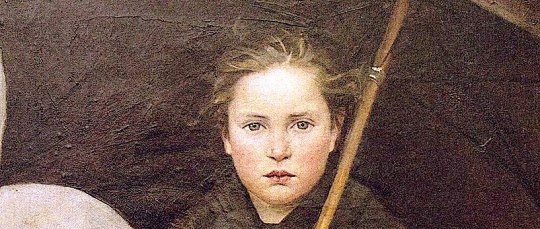
Explore O:JA&L’s Buttonhook Press offerings on Amazon. Support publication of Erik Harper Klass's forthcoming novella. Subscribe to the O:JA&L YouTube channel. Become an O:JA&L Member through Patreon. Follow O:JA&L on Facebook. Buttonhook Press 2023 Pamphlet Series A Writer's Portfolio Adrienne Pilon Rain Comes to the Central Valley Click on the title to explore or download the free PDF pamphlet. Copyright © 2023 by BUTTONHOOK PRESS An imprint of OPEN: Journal of Arts & Letters (O:JA&L) All rights reserved on behalf of OJAL Art Incorporated, O:JA&L/BHP/HBP and Adrienne Pilon. Publishing since 2017 as OPEN: Journal of Arts & Letters (O:JA&L) and its imprints Buttonhook Press and HOT BUTTON PRESS Contemporary Issues, OJAL Art Incorporated supports writers and artists across the world. Set in Garamond and formatted in CreateSpace Brand content set in Garamond and GARAMOND ALLCAPS Made available online and/or printed in the USA and elsewhere as a novelty and commemorative document celebrating the publication of Adrienne Pilon‘s pamphlet. About the writer: ADRIENNE PILON is a writer, teacher, and editor. Recent work appears in Thimble Lit, The Tiger Moth Review, The Linden Review and elsewhere. She lives in North Carolina and sometimes other places with her family. Cover Image: The Umbrella by Marie Bashkirtseva (1858-1884). Oil on canvas. 36.6 x 29.1 inches. [Copied from an art book.] 1883. Public domain. OJAL Art Incorporated, publishing since 2017 as OPEN: Journal of Arts & Letters (O:JA&L) and its imprints Buttonhook Press and HOT BUTTON PRESS Contemporary Issues, supports writers and artists worldwide. Follow O:JA&L on Facebook. OPEN: Journal of Arts & Letters (O:JA&L) recommends the services of Duotrope. Duotrope® https://ojalart.com/buttonhook-press2023-pamphlet-seriespoetry-all-forms-stylesa-writers-portfolioadrienne-pilonrain-comes-to-the-central-valley/?utm_source=ReviveOldPost&utm_medium=social&utm_campaign=ReviveOldPost
0 notes
Photo

Adekunle Adewunmi, Contributing Editor Featured Writer Interview: Rachel Custer Rachel Custer is an American poet. Her first full-length collection, The Temple She Became, is available from Five Oaks Press. Other work has previously been published or is forthcoming in Rattle, OSU: The Journal, The American Journal of Poetry, B O D Y, [PANK], DIALOGIST, & others. Adewunmi for O:JA&L: We will just start, I think, with whatever you are willing to tell us about the beginning, the awakening of the poet in you, about your early experiences and how they helped to bring you eventually to the notice of the American poetry audience. Custer: Over ten years ago, when I was an undergraduate in college, I took a couple of workshop-type poetry courses with a poet named David Dodd Lee at Indiana University, South Bend. Prior to that, I had a beginner poetry class with George Kalamaras at IPFW. My undergraduate degree is in English, but that is the extent of my “formal” education in writing poetry as far as the workshop goes. I often wonder how effective the workshop model is at making writers better, though I did thoroughly enjoy those courses. I would say that my English Literature classes probably taught me as much about writing poetry, and how to learn to write poetry, as the workshops, because they reinforced the amazing breadth of poetry there was to read and how important it is to ground one’s knowledge in what has come before. Adewunmi for O:JA&L: With that understood, can you describe for us your poetry workshop experience and give us an idea of what distinctive contribution, if any, the formal study of the craft made to your emerging capabilities as a poet? Custer: I was so blessed to study with so many talented poets in those classes. David himself is so talented and has written so much. Those classes led to at least a basic knowledge of what it even meant to submit a poem to a magazine, or even just the idea that maybe my work could be published in a collection someday. Where I went to school, in a small rural Indiana town, we didn’t have a lot of art programs or much of a local arts community. So though I have been writing since I first learned to write my name, I mostly shared my work only with family and friends. I’m not sure I ever realized until I was in college that contemporary poetry existed to the extent it does. That’s such an odd thing to realize, but it’s true. I read “Sir Gawain and the Green Knight” before I ever read a contemporary volume of poetry. The thing that sticks with me about David, and what he taught me most of all, was to take poetry down off its pedestal a bit. I struggled to write sometimes because my desire was always to write the most earth-shattering thing. You know? I never wanted to write a poem if it wasn’t going to end up canonized. Of course, I had no idea how one went about ending up canonized, I suppose, but it seemed to me that if I could just write a poem that was amazing enough, it would change the world. Surely it would find its way to glory, I guess. It seems so naïve now. But that was what I had. I mostly learned to write by myself, or by reading, and to learn from an actual poet was just amazing to me. Adewunmi for O:JA&L: Was there for you, directly associated with the formal educational setting, some watershed moment, some epiphany that you can point to, that changed your way of thinking about your own poetry and the poetry of others? Custer: The best lesson David ever taught me was that my poetry, which at the time was in the confessional mode and very emotionally fraught, was “too precious.” I had mixed feelings about that at the time, of course, but he was right. I was using a jackhammer where a chisel would do. From David, I learned a poem didn’t have to change the world, and I learned the importance and effectiveness of restraint. He also introduced me to so many new contemporary poets, and even some that would probably be “classics” to others. To me, it was all just amazing, that actual people did this thing I had been doing, and that they were real people. Just writers, writing and publishing. I lived for that class. Adewunmi for O:JA&L: When did you realize that you were a poet, a writer? What is the engine that powers your purposes? Custer: I feel like it’s a cliché, but I have always written. I have literally always written, since I first learned to write my name. I just always loved it. More than that, I needed it. When I was eight, I began really struggling with intense episodes of panic. I was diagnosed with panic disorder with agoraphobia, which meant it was increasingly difficult for me to leave the house. I used to sit in class, just horribly scared, counting off the minutes until school was over and I could go home. I have notebooks from the worst times that are filled with tally marks where I marked off the minutes. It was my attempt to break down time into segments that felt manageable. And I read and wrote because it provided me with an escape. If I could lose myself in a book, or in writing a poem, I could sometimes become distracted enough that several minutes would go by at a time. It always felt so good to draw several tally marks at once. And, of course, during the time I escaped, I was not so scared. Also when I was eight, I witnessed a neighbor boy molest my sister. That may have been the catalyst for the panic attacks; I don’t know. But I mention it because it was the experience upon which a lot of my first book builds, along with other sexually traumatic experiences when I was older. So I wrote, in a sense, to escape the present and my body in the same way I did during those traumas – to dissociate. I still write to dissociate. My partner always jokes that she can tell when I’m deep into writing a poem because I get a look on my face like I’m not even there. (I suspect it’s a rather stupid one, honestly.) And that is my entire desire when writing. To reach that sweet space where I feel simultaneously alive and entirely outside of my body. It’s almost a transcendent experience, religious in its own way. And, during my terrified childhood, it was necessary just to keep myself sane. A poem is a room where I don’t have to feel afraid. Adewunmi for O:JA&L: That “sweet space” seems to be the perfect place of creation. Where does the awareness of audience or the intent to publish enter your process? Custer: This is interesting to recall, because I’m not sure I really made the decision to publish or not to publish. All I’d ever wanted to do was to publish my writing. Right there in anthologies alongside Shakespeare and Donne and Dickinson. I had no idea how to go about it, and no understanding of the “industry,” but I knew I wanted people to read my work. David Dodd Lee’s class led to a small writing group of amazing artists in South Bend. Naoko Fujmoto is a brilliant poet and artist, and she created the stunning cover of my book. I fully expect her work to win prizes and honors at every turn. She is just so good. Anyway, we all kind of learned as we went, or at least I did. I learned so much from those writers, so much of value. And I learned a lot about different ideas, too. I sometimes tend to feel like I don’t fit in well with others, especially in academia and the poetry community, for various reasons. But that was a great experience. Adewunmi for O:JA&L: What was you first step out of the safe space of creation into the hard-edged marketplace of poetry? Custer: One night, I sent a few poems to journals that were listed on the “25 fastest markets” on Duotrope because I would be too anxious if I had to wait too long for a response. My first poem was accepted after a few rejections, and I think that was a moment of singular joy for me. I had a few poems accepted, and even a feature done on my work, and then everything kind of slowed down while I wrote more. It is crazy to think of how much I didn’t know then about the way to go about things. There was just nobody to tell me until that group of writers. It was such nourishment to feel surrounded by people who loved to write and who moved through life as artists. I had never had that before, just because of where I came from. Adewunmi for O:JA&L: In spite of where you might have come from, you are earning reputation and status as a poet, a fact which no one can doubt. “Your star is rising,” as the saying goes. Can you trace for us briefly that trajectory? Custer: In 2015, I believe it was, I applied to the AWP Writer-to-Writer mentorship, which changed my life in so many ways. It is just a fantastic program, and it was affordable enough that I could scratch together enough money to apply. I was accepted and had the chance to work with fantastic poet Kerrin McCadden. From her I learned so many of the “nuts and bolts” of the poetry community, and she gave me a lot of encouragement as far as the poems I was then writing. She introduced me to a facebook writer’s group as a means of finding community from my home. It turned out to be a pretty horrible experience for me overall, but I met some amazing friends and writers as well. There were a lot of ways in which I didn’t (and don’t) speak the language of the online poetry community – especially that particular one – and it was not the easiest introduction to the larger contemporary poetry scene. That being said, I found my publisher, Five Oaks Press, through that group. Lynn Houston read my manuscript during her open reading period and accepted it and published it. Looking back, I realize what a backwards way I handled things, but I just did not have any clue that most people submitted to contests for their first books. When the first press that had accepted my manuscript folded, she offered to read manuscripts, and I sent mine, and she accepted it. https://ojalart.com/custer-extended-biography-with-links-and-interview-text/?utm_source=ReviveOldPost&utm_medium=social&utm_campaign=ReviveOldPost
0 notes
Photo
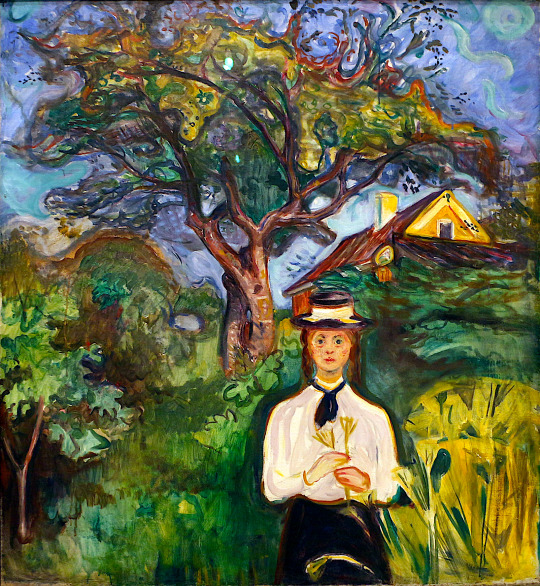
Explore O:JA&L’s Buttonhook Press offerings on Amazon. Support O:JA&L’s free presses. Subscribe to the O:JA&L YouTube channel. Become an O:JA&L Member through Patreon. Follow O:JA&L on Facebook. Betsy Martin OF KALE Barefoot, Lena leads me along rows of lettuce, squash, and broccoli. The brim of her Western hat is jauntily cocked, her forearms browned, peeling from hours of sun. She probes the loam, hoping to find herself in the roots of plants, so simply anchored. Prevailing winds have scattered the seed. When we come to the kale, she plucks for me a bunch, and holds it lithely as a dancer would a bouquet of flowers, the curly green plumes flowing up and out from her hands, she rising from the earth, from the seed of herself, a goddess of kale, of chlorophyll and light. About the writer: Betsy Martin’s chapbook Whale’s Eye was published by Presa Press in June 2019. Her poetry has appeared or is forthcoming in Atlanta Review, The Briar Cliff Review, California Quarterly, Cloudbank, Diverse Voices Quarterly (Best of the Net nomination), Dunes Review, Green Hills Literary Lantern, Juked, Louisville Review, The MacGuffin, Midwest Quarterly, MORIA, Pennsylvania English, The Round, THINK, Wrath-Bearing Tree (Pushcart nomination), and many others. She worked for many years at Skinner House Books in Boston. She has advanced degrees in Russian language and literature and lived in Moscow studying at the Pushkin Institute during the exciting transitional period of Glasnost. Image: Girl Under an Apple Tree by Edvard Munch (1863-1944). Oil on canvas. 43.5 x 39.6 inches. 1904. Public domain. OJAL Art Incorporated, publishing since 2017 as OPEN: Journal of Arts & Letters (O:JA&L) and its imprints Buttonhook Press, HOT BUTTON PRESS Contemporary Issues, and HIGH BUTTON PRESS Contemporary Art, supports writers and artists worldwide. Follow O:JA&L on Facebook. OPEN: Journal of Arts & Letters (O:JA&L) recommends the services of Duotrope. Duotrope® https://ojalart.com/poetry-all-forms-stylesbetsey-martin-of-kale/?utm_source=ReviveOldPost&utm_medium=social&utm_campaign=ReviveOldPost
0 notes
Photo

Jean Ryan A Few Words for My Father The news of your death brought no ripples of sadness— no satisfaction either, though it might have. I did wonder what I would have felt had I felt anything at all. That’s how good I was at erasing you from the life you left me with. Last time I saw you was in a store, 50 years ago. I was searching through blouses and there you were, dangerously close, your face a sudden, chilling fact. We said whatever we said and then I got away, something I couldn’t do when I was a child, when wonder and terror were my only options: one moment gaping at tadpoles, the next hiding in the woods. From behind the trees I could see our house, knew you were in there, prowling. She didn’t know, my mother maintained, though you were hardly cautious. Like so many others, you got off easy. I wish I could have faced you and wielded my only power: words to take to your grave, hurt that never heals. About the writer: Jean Ryan, a native Vermonter, lives in coastal Alabama. Her debut collection of short stories, Survival Skills, was published by Ashland Creek Press and short-listed for a Lambda Literary Award. Lovers and Loners is her second story collection. Her book of nature essays, Strange Company, is available in digital form, paperback and audio. Image: Asinka by Sonia Ferradj. Mixed media. No size specified. No date specified. By permission. Ferradj is an artist in Paris. https://ojalart.com/ryan-poem/?utm_source=ReviveOldPost&utm_medium=social&utm_campaign=ReviveOldPost
0 notes
Photo
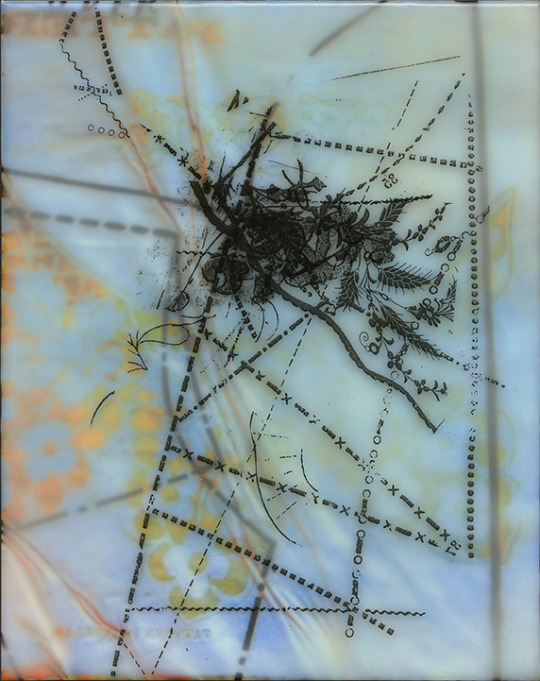
Ann Lovett Sometimes they come undone crossword clues, seven down, stumblebum, eight across, lascivious. Try chiaroscuro, the light of god striking Paul like a club on the road to Damascus, his speechless tongue, his blinded eyes. Try Zeppelinistic, great Hindenburgs that burst into flames, float away untethered. For my mother the names for common things slipped away first, bits of paper down a stream: canister, refrigerator, vacuum. Ash of old conversations settling on an unopened book. Then watch, teeth, meat. Mother. Daughter. The last to go, my father’s name, a final silence unwinding its unlined sheet. Now I chant my own to hear its sound, assemble language into a word-shuttered house. Murmur. Sullen. Fist. I nail them to the page one by one. About the writer: Ann Lovett is a poet and visual artist living in Ashland, Oregon. She holds an MFA in Printmaking from Tyler School of Art and an MFA in Poetry from Warren Wilson College. Recent publications include the Bellevue Literary Review, Arkana, Wolfpack Press, Gyroscope Review, Shawangunk Review, and an anthology, The Writers Studio at 30. Image: Untitled from the Pattern Drawings Series by Ann Lovett. Mixed media image on panel (digital pigment prints with encaustic medium (beeswax) and image transfer). No size specified. No completion date specified. By permission. https://ojalart.com/lovett-poem-2/?utm_source=ReviveOldPost&utm_medium=social&utm_campaign=ReviveOldPost
0 notes
Photo
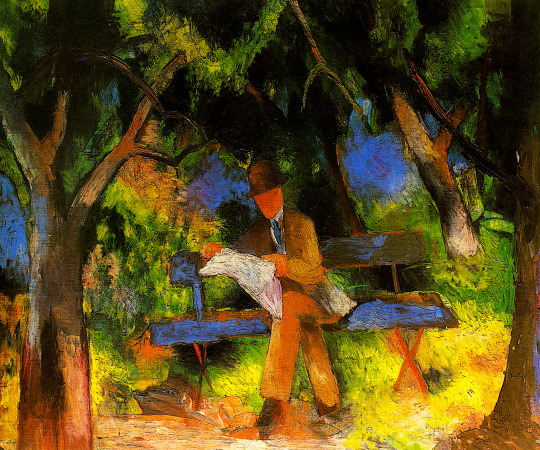
Because we want to get a head start on showcasing your best seasonal content, we're inviting new submissions as FEATURED SEASONAL CONTENT across all categories. Explore O:JA&L’s Buttonhook Press offerings on Amazon. Support publication of Erik Harper Klass's forthcoming novella. Subscribe to the O:JA&L YouTube channel. Become an O:JA&L Member through Patreon. Follow O:JA&L on Facebook. An O:JA&L Writer's Portfolio Featured Writer Jim Meirose I LIKE THE CEMETERY To explore more of Jim Meirose's work, view or download Experimental Storytelling: The Timeline of Complementary Realities the free PDF in the 2023 O:JA&L Chapbook Series. I like the cemetery. I like the cemetery. I like the cemetery, yes. I really do. I like it so much an’, ‘nd ‘lso I like to read. The whole of the place is of little importance, ‘cause; to read, when, yes to read, when the bus, by the cemetery, pulls up, in its cloud of yellow gas, exactly ‘efore the gate of the cemetery, drops me off all loud like that, right by the way straight in, e’, wh’ it’s early and I, dropped off early ‘cross from the cemetery, for school to start later cross o’er the street, bring, while the bus blows away its thick black loud-cloud, leaving me there for school that starts later, myself off, too early for school, a book with me to the gateway into the cemetery. The whole of the place goes t’ nothing when I bring my book right in past the gate, n’, yes, I do daily bring my book and myself ‘lso through that same gate, ‘n hour ‘efore school, which yes, I do daily, unless it’s not really; ‘t mostly do the same ‘xact do every time. Then my books and my bag led me deep into the cemetery. Once there all puts ‘tselves down ‘n one exactly same stone. I then sit down there too, on another, ‘n, then; the book brought in opens. Gets read by me; read. Read, ah ‘nd as the whole of the place’s becomes ‘ven less than not nothing, ‘ll gone. A gone et ‘ne can’t see hear smell ‘r knows nothing ‘tall of, yes. So fine. Fine. Book read’s an hour ‘t-time. So fine, ahhhhhh. I like the cemetery. I like the cemetery. I like the cemetery, yes. I really do. About the writer: Jim Meirose's short fiction has appeared in leading journals, and his novels include Sunday Dinner with Father Dwyer (Optional Books), Understanding Franklin Thompson (JEF), Le Overgivers au Club de la Résurrection (Mannequin Haus), and No and Maybe - Maybe and No (Pski's Porch). Image: Lesender Mann im Park by August Macke (1887-1914). Copied from an art book. No medium specified. No size specified. By 1914. Public domain. OJAL Art Incorporated, publishing since 2017 as OPEN: Journal of Arts & Letters (O:JA&L) and its imprints Buttonhook Press and HOT BUTTON PRESS Contemporary Issues, supports writers and artists worldwide. Follow O:JA&L on Facebook. OPEN: Journal of Arts & Letters (O:JA&L) recommends the services of Duotrope. Duotrope® https://ojalart.com/an-ojal-writers-portfolioexperimental-discourse-fictionfeatured-writer-jim-meirosei-like-the-cemetery/?utm_source=ReviveOldPost&utm_medium=social&utm_campaign=ReviveOldPost
0 notes
Photo
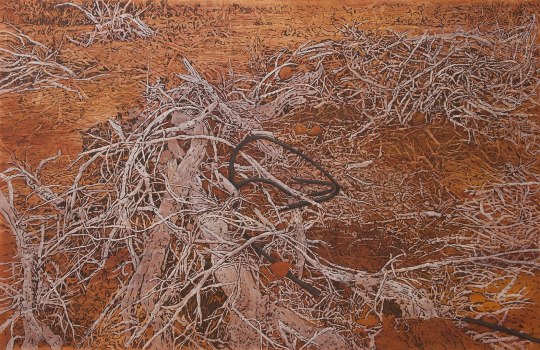
Dmitry Blizniuk The Epoch of Miracles The girl made of sparkling braces, golden braids, and plush reveries, do you remember our living caves constructed of blankets and a warm plasticine darkness that greedily breathed inside? Or our huts of branches under the moiré canopy of apricot trees? Do you remember the primeval infatuation of the cave dwellers? An apple, sandwiches, an absurd doll, a water pistol… Like a home task given by God, if stranded on another planet, we could’ve reproduced the whole mankind, waking up each morning under the light blue sky. A busty progenitress resembling a pompous vegetable-seller was hidden deep in your body. There was a hunter and a warrior in me – a hardened ape, covered with scars. The epoch of miracles blazed up like spilled gunpowder, but it didn’t bring about a supernova explosion. The scarlet flower has built up silly muscles. The time of miracles has annihilated itself, as if Bonnie and Clyde started shooting in Disneyland. Ripping off the floor boards in the old house, where decrepit ballet dancers of desolation stroll the uninhabited rooms, I see underneath a small cat’s skeleton. The cat’s name was Yasia. What was your name? About the writer: Dmitry Blizniuk is an author from Ukraine. His most recent poems have appeared in The Pinch, Press53, The Nassau Review, Havik, Naugatuck River Review, and many others. A Pushcart Prize nominee, he is also the author of The Red Fоrest (Fowlpox Press, 2018). He lives in Kharkov, Ukraine. Image: Orchard 3 by Hadar Gad (1960-). Oil on canvas. 136 x 210 cm. 2012. By free license. https://ojalart.com/featured-series-elegypoetry-all-forms-stylesdmitry-blizniukthe-epoch-of-miracles/?utm_source=ReviveOldPost&utm_medium=social&utm_campaign=ReviveOldPost
0 notes
Photo
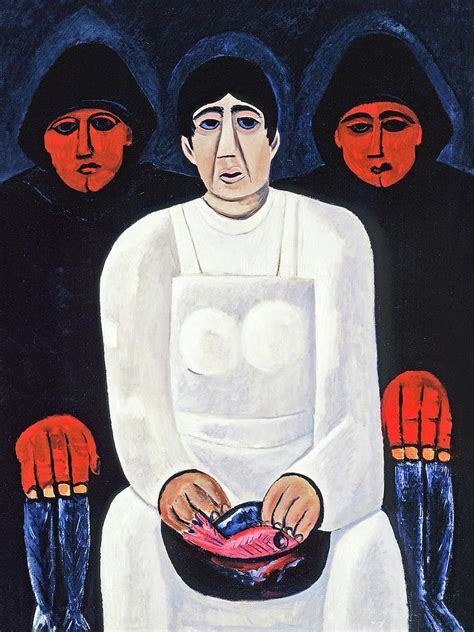
Explore O:JA&L’s Buttonhook Press offerings on Amazon. Support O:JA&L’s free presses. Subscribe to the O:JA&L YouTube channel. Become an O:JA&L Member through Patreon. Follow O:JA&L on Facebook. Maggie Nerz Iribarne THE MELTDOWN At 4 AM, just as the grandfather clock chimed in the hall, Mrs. Starch shrieked from her room. “No! No! Noooooooo!” One of her nightmares. Mr. Starch’s painted eyes followed me, his stern brow and navy suit imposing as I stood listening and watching at the door. Mrs. Starch’s little white head poked from the covers. She thrashed in the shadowed bed, screaming, yelling. I honestly felt sorry for her, but I would not enter. Rule #1 at Mrs. Starch’s house: never ever go into her room at night. . In the morning, she complained about the too cold bathing water, her unclean dentures, her incorrectly set table, her wrong-channeled television. I knew better than to mess up her toast. Apparently, I was the only one who could get it to that perfect almost-burned state. She clenched her fists on the table while silently surveying the breakfast plate. In the Mrs. Starch world, silence meant you did things right, or you hadn’t screwed things up too much. I tidied up the kitchen, the news station ratcheted to decibel 5000. My relief, Jasmine, entered through the garage door. “Hey Becca,” she said. “Hey.” “Will you two stop your gabbing and do some work for once?” Mrs. Starch grumbled from the kitchen table. Jasmine raised her eyebrows as I patted her shoulder in a “good luck” gesture. I gathered my things and left with just two hours before my shift at Shop Rite. Thank God my mother got Tate up and out the door to school each day. . Later, the school called to say Tate had an upset stomach. My mother was busy at her own waitressing job, so I rushed from the store to get him, enduring the scowl of my manager. “Why don’t you stay in the bathroom until things settle down?” I said to Tate, once we arrived home. He miserably accepted the blanket and pillow I arranged for him on the tile floor. “What if I’m sick for the party?” “You won’t be,” I said, and wanted to believe it. At five, my mother arrived. I went to my room for a nap but couldn’t sleep. At seven I headed over to Mrs. Starch’s. . I found her hunched figure in the kitchen, ghost-like beneath the pale light. I didn’t say hello, knowing that could invite all kinds of trouble. She sipped on her nightly cocktail-two ounces of whiskey. I refreshed her crushed ice and went about my business, tidying, dusting, preparing her room for bed, the clothes for the next day. I switched on the lights in the hall, dusted her large collection of bells displayed on the living room shelves. It struck me odd she’d collect something so frivolous. It didn’t track. There were no family photos at all, just the painting of Mr. Starch. At six I served her meatloaf dinner. At eight she refused her walker, so I rolled her in the wheelchair to the bedroom. As I assisted her on the commode, bathed and dressed her, she continued griping. Her sheets should have been washed and changed, her pajamas itched her neck, the room smelled like urine. I sealed my lips shut and lifted her into the bed. She was lighter than Tate. Reclined, she surveyed me with narrowed grey eyes and toothless gums. She wore a little nightdress with pink cats all over it. Another thing that didn’t track. “Which one are you?” she asked. “Becca.” “Whatever,” she said, turning on her side. I left her in the darkness of her room, went to my place in the den. God, I was so tired. I ignored the textbook gaping from my bag. We weren’t supposed to sleep on the nightshift, but most of us did. All of us were working two or three jobs, had kids, some of us were in school. Some people even brought their own blankets and pillows from home, a big no-no. I sat down on the couch and tilted my head, drifting quickly to sleep. . A loud clatter jolted me awake. I approached Mrs. Starch’s doorway. Out of bed, she mumbled, attempting to squat above the garbage pail. I rushed in to stop her from falling. She awoke fully, screamed bloody murder. Her body spasmed in anger, collapsed, her head slammed against the nightstand. “Oh my God!” I yelled, kneeling next to her. “What have you done to me? What have you done?” I ran a hand along her forehead and touched blood. Lots of blood. I pulled out my phone, dialed 911. “You, you people. You stupid useless people. You know the rule. Do. Not. Bother. Me. Ever. Do not bother me at night!” she said.. I jumped on board the ambulance, Mrs. Starch still shouting her head off. “Don’t let that woman near me!” Blood drenched her kitty nighty, my scrubs. Unable to restrain myself, I started to cry. “Oh for God’s sake,” she said. At the hospital, we waited until morning in the crowded ER. Mrs. Starch fired insults at me and everyone else. In the hallway, I called her unconcerned niece in California. “You’ll stay with her?” she asked. “I will,” I said, Tate’s school party tugging. My mother called out sick from the restaurant to bring the cupcakes. She texted a photo. Sadness overcame, a dark wave pulling me under. Mrs. Starch turned her bandaged head. “Now what are you crying about?” she said. Having had my fill of her, I didn’t answer Her steady stare weakened me. “It’s my son’s birthday. I missed his party,” I said, preparing for her assault, Well it’s your own damn fault. She allowed a minute of silence, then slid a withered veiny hand toward mine. “I had a child once,” she said. Finally, the angry iron gate of her face broke free of its tight hinges. Her expression dissolved into a wrinkled curtain of loss, loneliness. I held onto her hand lightly, careful not to hurt her fragile bones. About the writer: Maggie Nerz Iribarne is 54, lives in Syracuse, New York, writes about witches, cleaning ladies, struggling teachers, neighborhood ghosts, and other things. She’s won prizes in contests sponsored by The Jane Austen Literacy Society, Defenestrationism, Zizzle, Honeyguide, Books ‘n Pieces, Dead Fern Press, On the Premises, The Scottish Book Trust, and Re:Fiction. Image: The Lost Felice by Marsden Hartley (1877-1943). Oil on canvas. No size specified. 1939. Public domain. OJAL Art Incorporated, publishing since 2017 as OPEN: Journal of Arts & Letters (O:JA&L) and its imprints Buttonhook Press, HOT BUTTON PRESS Contemporary Issues, and HIGH BUTTON PRESS Contemporary Art, supports writers and artists worldwide. Follow O:JA&L on Facebook. OPEN: Journal of Arts & Letters (O:JA&L) recommends the services of Duotrope. Duotrope® . https://ojalart.com/flash-fictionshort-short-storymaggie-nerz-iribarnethe-meltdown/?utm_source=ReviveOldPost&utm_medium=social&utm_campaign=ReviveOldPost
0 notes
Photo

Can't wait for the season to be over? Neither can some of us. Because we want to get a head start on showcasing your best seasonal content, we're inviting new submissions as FEATURED SEASONAL CONTENT across all categories. Explore O:JA&L’s Buttonhook Press offerings on Amazon. Support publication of Erik Harper Klass's forthcoming novella. Subscribe to the O:JA&L YouTube channel. Become an O:JA&L Member through Patreon. Follow O:JA&L on Facebook. Penelope Schott AS IF TO BELIEVE IN PRAYER Explore more of Penelope Schott's work by downloading her new PDF pamphlet OLD BARN, OR HOW THINGS GO ON available now from O:JA&L's Buttonhook Press. As if to believe it could work, that someone is listening, that it differs from wishing, as if to believe the coyotes on the hill are calling for you as you stand at the midnight window watching the stars for long enough that the stars move, as you lean west with the planet that carries the ashes or bones of those who loved you before you were born it’s like the heavy saucepan in your kitchen where your dead grandmother made soup with lentils, celery, ham bone, prayer, and while you are tasting the soup, a small gray bird is rattling the feeder chirping Now, Now, the permanent Now you have entered briefly, that Now from which you know you will depart. About the writer: PENELOPE SCAMBLY SCHOTT’s work has been published in Adanna, American Poetry Review, CALYX, Cider Press Review, Connecticut River Review, Evening Street Review, Georgia Review, Gyroscope, Miramar Magazine, Panoply, Passager Journal, Paterson Literary Review, Rat’s Ass Review, The Raven’s Perch, and others. She is a past recipient of the Oregon Book Award for Poetry. The author of twenty poetry books, her most recent include On Dufur Hill (Turning Point Publishers), Sophia and Mister Walter Whitman (The Poetry Box), and Waving Fly Swatters at Angels (Turning Point Publishers). She lives in the small (pop.: 632) wheat-growing town of Dufur, Oregon. Image: High Mass at a Fishing Village on the Zuyder Zee by George Clausen (1852-1944). Oil on canvas. 18.1 x 14.1 inches. Public domain. OJAL Art Incorporated, publishing since 2017 as OPEN: Journal of Arts & Letters (O:JA&L) and its imprints Buttonhook Press and HOT BUTTON PRESS Contemporary Issues, supports writers and artists worldwide. Follow O:JA&L on Facebook. OPEN: Journal of Arts & Letters (O:JA&L) recommends the services of Duotrope. Duotrope® https://ojalart.com/poetry-all-forms-stylespenelope-schottas-if-to-believe-in-prayer/?utm_source=ReviveOldPost&utm_medium=social&utm_campaign=ReviveOldPost
0 notes
Photo
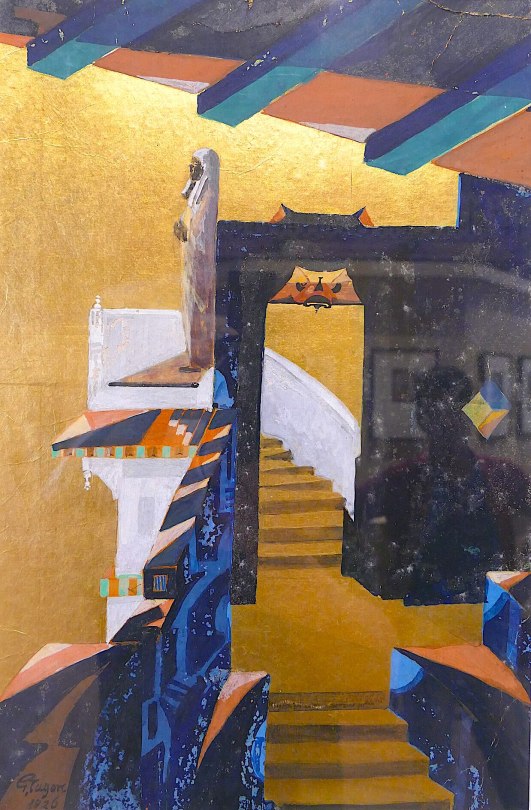
Explore O:JA&L’s Buttonhook Press offerings on Amazon. Support O:JA&L’s free presses. Subscribe to the O:JA&L YouTube channel. Become an O:JA&L Member through Patreon. Follow O:JA&L on Facebook. Aditi Kay Candies for a Birthday The morning of my 13th birthday, I went to school as usual. At home, my mother got up early, prepared tea for my father, and got my younger siblings ready. It was just another rushed, ordinary day. I was sure my parents would remember my birthday only after they had looked at the morning paper. They would note the date and look at each other guiltily. I felt glad at this thought. My friend Nina got me a whole bag of candies from the tiny school store. Candies, sweet, syrupy, and of different lip-changing colors. I shouldn’t have too many of these, I told Nina, remembering my mother’s warnings, the way her eyes always ran down my unshapely, unsightly figure. I looked frumpy in whatever I wore. Nina said I was healthy, not fat at all. Nina often gave me a ride home from school. We rode in one of the cycle rickshaws her father owned, and I heard her chatter as we traveled almost a half-circle covering the entire town before we reached her home. Sometimes she dropped me off first. These days on google maps I can trace the route the rickshaw took, those warm summer afternoons. Down the small rocky lane out of school, past the one-story cottages, the suddenly busy crossing with the ever-perspiring traffic policeman on his stand, then the road lined with shops selling fabrics, utensils, and toys. Nina stopped her chatter then, for she loved to look at the saris draped outside the shops, and those displayed on stands and wires, fluttering brightly like millions of rainbows. While I thought of home, and if my mother would be pacing the portico looking out for me, wondering why I had not come home in the car sent with a driver to bring us back. I preferred the rides with Nina because I wanted to make my mother worry. But she was always preoccupied with my younger siblings. They were better behaved, my mother always said. What she never told me was that they were better than me in every way: my sister was prettier, my brother got better grades than I did. I thought my mother might notice me if I disappeared entirely or changed into something not so unshapely. If I shrank, became smaller, quieter, less troublesome, she would look out for me. I think now that was when little by little, unobtrusively, quietly, and obsessively, I stopped eating. Over weeks, months, all I did was think about food. I counted calories, assessed foods almost scientifically, pushed food around on my plate, and secretly read up all I could about diets; the newspapers then carried advice columns by prominent film stars and models on their regimen. I measured my waist every day with a tape, secretly again, in the bathroom. In weeks, months, as I lost weight, I lost interest in a lot of things. I dwindled and shrank. I wanted to look like all the lovely women I saw in magazines and on television who could wear anything they wanted. I waited, wanting my mother to tell me this. These were years in which I lost touch with Nina. Years, when we moved places; she, to a different college and I moved cities too. Years when my mother changed as well, slowly, and suddenly. She wept when she lost her mother. Then the years when she began talking more to me, as my siblings moved away. She told me of her conservative, hidebound in-laws, the vicious envy of other women, the loneliness of new motherhood. It took years but now my mother appeared someone different: a vulnerable, troubled being, lost in the role thrust on her. She had once faded away too. Maybe I was just a better listener. One year, during a conversation, I thought my mother said: You were with Nina. I never had to worry about you. Recently I was on Facebook and Nina came up, like an algorithmic vagary. Outside, the leaves were falling fast in the breeze. Red, yellow, and purple in color, almost like saris, smaller in shape, moving in the wind. It was September and I remembered something. I messaged her, unsure and impulsive: Your birthday must be near. It’s today, she answered, instantly. And yours is two months away. She sent me an emoji: a candy-shaped one. The moment I clicked on it, it burst, throwing up stars, scattering the years away. About the writer: Aditi Kay studied at Vermont College of Fine Arts for an MFA in Writing. Her work has appeared or is forthcoming in The Missouri Review, The Common, On The Seawall, Catamaran Literary Reader, The Maine Review, Litro Magazine, South Dakota Review, Blood Orange Review, and elsewhere. She writes regularly for a Bombay-based digital magazine called Scroll.in. A collection of short stories A Sense of Time and Other Stories was published by Weavers' Press in San Francisco. Her new novel, The Kidnapping of Mark Twain : A Bombay Mystery (Speaking Tiger Books, India) is available now. Aditi Kay lives in New Jersey with her family. Image: Ahzan by Gaganendranath Tagore (1867-1938). Tempera on paper. No size specified. By 1938. Public domain. OJAL Art Incorporated, publishing since 2017 as OPEN: Journal of Arts & Letters (O:JA&L) and its imprints Buttonhook Press, HOT BUTTON PRESS Contemporary Issues, and HIGH BUTTON PRESS Contemporary Art, supports writers and artists worldwide. Follow O:JA&L on Facebook. OPEN: Journal of Arts & Letters (O:JA&L) recommends the services of Duotrope. Duotrope® https://ojalart.com/flash-nonfictionpersonal-essay-memoir-vignetteaditi-kaycandies-for-a-birthday/?utm_source=ReviveOldPost&utm_medium=social&utm_campaign=ReviveOldPost
0 notes
Photo

Srinivas S orchard breeze… every song from our childhood About the writer: A phonologist by training and an English teacher by profession, Srinivas S currently lives and works in Chennai, India. His downtime interests include cricket and poetry. He started writing haiku only a year ago and likes the form because it allows him to record simple moments even when he is on the move. Image: Composition by Matsumoto Shunsuke (1912-1948). Oil on cardboard. 21.8x27 cm. 1941. Public domain. https://ojalart.com/poetry-all-forms-stylessrinivas-sorchard-breeze-haiku/?utm_source=ReviveOldPost&utm_medium=social&utm_campaign=ReviveOldPost
0 notes